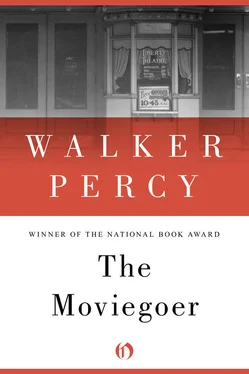“But it’s the business part of it that worries me—”
“Business and pleasure don’t have to mix.”
“Well, all I wanted you to know was that when I acted on impulse—”
“I always act on impulse. I believe in saying what you mean and meaning what you say.”
“I can see that.”
“You just ask Joyce what I said about you.”
“Joyce?”
“My roommate.”
“What did you say?”
“You just ask her.”
I look up and down the beach. “I don’t see her.”
“I don’t mean now, you jackass.”
We swim and lie down together. The remarkable discovery forces itself upon me that I do not love her so wildly as I loved her last night. But at least there is no malaise and we lie drowsing in the sun, hands clasped in the other’s back, until the boat whistle blows.
Yet loves revives as we spin homewards along the coast through the early evening. Joy and sadness come by turns, I know now. Beauty and bravery make you sad, Sharon’s beauty and my aunt’s bravery, and victory breaks your heart. But life goes on and on we go, spinning along the coast in a violet light, past Howard Johnson’s and the motels and the children’s carnival. We pull into a bay and have a drink under the stars. It is not a bad thing to settle for the Little Way, not the big search for the big happiness but the sad little happiness of drinks and kisses, a good little car and a warm deep thigh.
“My mother has a fishing camp at Bayou des Allemands. Would you like to stop there?”
She nods into my neck. She has become tender toward me and now and then presses my cheek with her hand.
Just west of Pearl River a gravel road leaves the highway and winds south through the marshes. All at once we are in the lonely savannah and the traffic is behind us. Sharon still hides her face in my neck.
A lopsided yellow moon sheds a feeble light over the savannah. Faraway hummocks loom as darkly as a flotilla of ships. Awkwardly we walk over and into the marsh and along the boardwalk. Sharon cleaves to me as if, in staying close, she might not see me.
I cannot believe my eyes. It is difficult to understand. We round a hummock and there is the camp ablaze like the Titanic. The Smiths are home.
2
MY HALF BROTHERS and sisters are eating crabs at a sawbuck table on the screened porch. The carcasses mount toward a naked light bulb.
They blink at me and at each other. Suddenly they feel the need of a grown-up. A grown-up must certify that they are correct in thinking that they see me. They all, every last one, look frantically for their mother. Thérèse runs to the kitchen doorway.
“Mother! Jack is here!” She holds her breath and watches her mother’s face. She is rewarded. “Yes, Jack!”
“Jean-Paul ate some lungs.” Mathilde looks up from directly under my chin.
My half brother Jean-Paul, the son of my mother, is a big fat yellow baby piled up like a buddha in his baby chair, smeared with crab paste and brandishing a scarlet claw. The twins goggle at us but do not leave off eating.
Lonnie has gone into a fit of excitement in his wheelchair. His hand curls upon itself. I kiss him first and his smile starts his head turning away in a long trembling torticollis. He is fourteen and small for his age, smaller than Clare and Donice, the ten-year-old twins. But since last summer when Duval, the oldest son, was drowned, he has been the “big boy.” His dark red hair is nearly always combed wet and his face is handsome and pure when it is not contorted. He is my favorite, to tell the truth. Like me, he is a moviegoer. He will go see anything. But we are good friends because he knows I do not feel sorry for him. For one thing, he has the gift of believing that he can offer his sufferings in reparation for men’s indifference to the pierced heart of Jesus Christ. For another thing, I would not mind so much trading places with him. His life is a serene business.
My mother is drying her hands on a dishcloth.
“Well well, look who’s here,” she says but does not look.
Her hands dry, she rubs her nose vigorously with her three middle fingers held straight up. She has hay fever and crabs make it worse. It is a sound too well known to me to be remembered, this quick jiggle up and down and the little wet wringing noises under her fingers.
We give each other a kiss or rather we press our cheeks together, Mother embracing my head with her wrist as if her hands were still wet. Sometimes I feel a son’s love for her, or something like this, and try to give her a special greeting, but at these times she avoids my eye and gives me her cheek and calls on me to notice this about Mathilde or that about Thérèse.
“Mother, I want you to meet Sharon Kincaid.”
“Well now!” cries Mother, turning away and inserting herself among the children, not because she has anything against Sharon but because she feels threatened by the role of hostess. “There is nobody here but us children,” she is saying.
Sharon is in the best of humors, rounding her eyes and laughing so infectiously that I wonder if she is not laughing at me. From the beginning she is natural with the children. Linda, I remember, was nervous and shifted from one foot to the other and looked over their heads, her face gone heavy as a pudding. Marcia made too much over them, squatting down and hugging her knees like Joan Fontaine visiting an orphanage.
Mother does not ask how I happen to be here or give a sign that my appearance is in any way remarkable — though I have not seen them for six months. “Tessie, tell Jack about your class’s bus trip.”—and she makes her escape to the kitchen. After a while her domesticity will begin to get on my nerves. By the surest of instincts she steers clear of all that is exceptional or “stimulating.” Any event or idea which does not fall within the household regimen, she stamps at once with her own brand of the familiar. If, as a student, I happened to get excited about Jackson’s Valley Campaign or Freud’s Interpretation of Dreams, it was not her way to oppose me. She approved it as a kind of wondrous Rover boy eccentricity: “Those? Oh those are Jack’s books. The stacks and stacks of books that boy brings home! Jack, do you know everything in those books?” “No’m.” Nevertheless I became Dick Rover, the serious-minded Rover boy.
It is good to see the Smiths at their fishing camp. But not at their home in Biloxi. Five minutes in that narrow old house and dreariness sets into the marrow of my bones. The gas logs strike against the eyeballs, the smell of two thousand Sunday dinners clings to the curtains, voices echo round and round the bare stairwell, a dismal Sacred Heart forever points to itself above the chipped enamel mantelpiece. Everything is white and chipped. The floors, worn powdery, tickle the nostrils like a schoolroom. But here on Bayou des Allemands everybody feels the difference. Water laps against the piling. The splintered boards have secret memories of winter, the long dreaming nights and days when no one came and the fish jumped out of the black water and not a soul in sight in the whole savannah; secrets the children must find out and so after supper they are back at their exploring, running in a gang from one corner to another. Donice shows me a muskrat trap he had left last August and wonder of wonders found again. They only came down this morning, Mother explains, such a fine day it was, and since the children have a holiday Monday, will stay through Mardi Gras if the weather holds. With Roy away, Mother is a member of the gang. Ten minutes she will spend in the kitchen working with her swift cat-efficiency, then out and away with the children, surging to and fro in their light inconstant play, her eyes fading in a fond infected look.
Читать дальше












